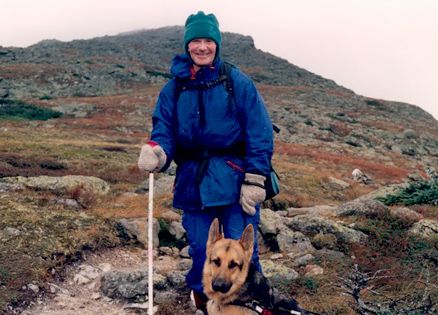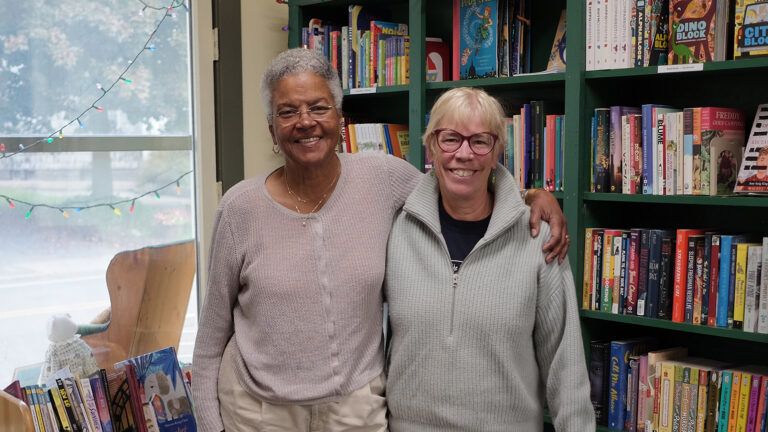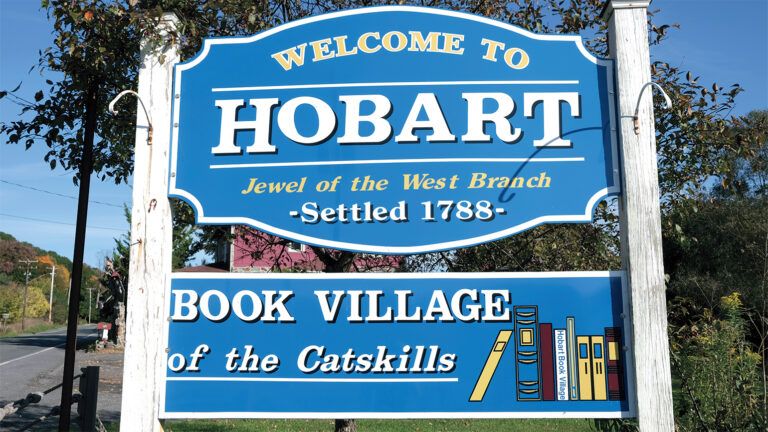November 8. We'd been on the trail for two and a half hours that freezing morning when I had to stop to thaw out my feet. Orient, my dog, curled up for a quick nap and Dave McCasland, my companion for this final tough stretch in Maine, heated water for cocoa. I yanked off my hiking boots and rubbed my throbbing toes.
There are basically three types of Appalachian Trail hikers: the ones who walk on it just to say they've been there; the ones who hike it in modest stretches; and that driven breed, like me, who try to "thru-hike" from Georgia to Maine, a grueling 2,143 miles of unforgiving terrain that defeats 90 percent of thru-hikers who attempt it. And those were hikers who could see.
For the thousandth time since I left Springer Mountain, Georgia, on March 8, I asked myself what in heaven's name a 50-year-old blind man and his Seeing Eye dog were doing out on the trail. All I wanted now was to reach the end at Mount Katahdin, less than 200 miles away, so that I could go home and stop hurting.
But we had to keep moving if we were going to cover the remaining 15 miles to the town of Monson, our ambitious goal for the day. Yesterday we'd made only 5.3 miles. Ice on Moxie Bald Mountain had given me and Orient fits. I was a mass of scrapes and bruises.
I laced on my boots and called for Orient. "We'll never make Monson at this rate," I grumbled.
Late in the afternoon we reached the confluence of Bald Mountain Stream and the West Branch of the Piscataquis River. Rain and snow had swollen the waters to a torrent. Dave said the river was divided into three branches, each about 30 feet wide. I could hear the roar of the rapids not far downstream, where the three branches joined.
I unharnessed Orient and told him to find his way across. He was a good strong swimmer. "See you on the other side, boy," I said, patting his flank. With arm's linked and backpacks loosened in case we had to lose them in a hurry, Dave and I inched into the icy water, using our hiking sticks for stability. We managed to reach a marshy island safely. But halfway across the next section, waist-deep in the surging current, Dave lost his footing and went under. I heard him sputtering and thrashing. An instant later I was swept off my feet and sucked downstream.
I bobbed to the surface, clawing at the water. Dave had managed to reach shore and was yelling to me. I heard Orient whining anxiously. But I was making no headway toward their voices. In desperation I went to the bottom of the stream and tried to pull myself along with my hands. Each time I shot up for a gasp of air, Dave would frantically try to guide me. Yet his voice was getting farther away and the thundering rapids closer and closer.
I dug my fingers deep between underwater rocks. I was literally crawling underwater. Finally, with my strength about to give, I thought I sounded close enough to grab Dave's outstretched hand.
"Come on, Bill!" he screamed. "Right here!"
I lunged toward the steep bank but all I grabbed was air. I began slipping back into the current and downstream again. Suddenly I hit a branch and held tight. Dave was able to clutch my arm and pull me through the mud and onto the riverbank, where I lay gasping and choking. Orient ran to my side, quaking with fear.
We needed to get warm fast. We had an hour till dark and less than that before hypothermia would begin playing its strange tricks on our minds. We forded the last fork then struggled up a long ridge for half an hour before Dave found a spot to pitch camp. Progress was slowed by our numb fingers, and there was not enough dry wood at hand to build a fire. Finally we got the tent up and ate some food, calories our bodies desperately needed to generate heat.
Shivering in our sleeping bags, an exhausted Orient wedged between us, we kept reliving the crossing. Had we lost our packs we would have been stranded without food or protection; many crossings still lay ahead on the way to Katahdin. Then for a long time we were silent. The only sounds in the dark were the chattering of our teeth and the wind lashing the tent. "Bill," Dave said softly at last, "how are we ever going to make it the rest of the way?"
It was high time I asked that question of myself.
Actually my journey began in a tent not unlike the one Dave and I shared. I had never been much of an outdoorsman, but the previous summer I went camping in Virginia with one of my sons, Billy, and his son, Jonathan. That outing was an attempt to make amends for the life I had led until recently, and the harm it had caused my family, particularly my three kids.
I'd lost my vision completely in 1976 after a lengthy battle with chorioretinitis. But in a sense I'd been a blind man long before that, blind to anything in life that didn't have to do with my own selfish desires. I had four failed marriages to my dismal credit. The first produced my children and the last broke up after I'd gone blind. The common thread in the wreckage of all four was my drinking. After my last wife left me I was content to work as a training director for a clinical laboratory by day, and spend evenings quietly boozing myself into oblivion. I guess I gave added definition to the term "blind drunk."
Then, mysteriously, wonderfully, as if someone else's plan for it suddenly kicked in, my life changed. My other son, Jeff, entered a substance-abuse treatment center. To my dismay, I was asked to spend a week there in family therapy sessions with him—without a drink. I scoffed but I went. I lashed out at counselors and was my usual arrogant self.
But by the end of that week it became painfully clear to me that I was an alcoholic, and I had to stop drinking or I'd die. I stopped with the help of a 12-step program. I also quit a five-pack-a-day cigarette habit. Then, a few months later, I made a Christian commitment. It all happened so fast that sometimes it seemed like it was happening to someone else. But I knew there was a lot of unfinished business in my life. That's why I wanted to get away from it all with Billy and my grandson on that camping trip to Virginia and see if I could begin repairing relationships.
We happened to be camped not far from the Appalachian Trail, and Billy told me a little bit about it. That night, before sleep, I felt so overjoyed at my new life that I begged God to give me a way to show my gratitude.
That's when the dreams started. I saw myself and Orient hiking from Georgia to Maine. It seemed like one of those absurd dreams, as if your mind is just taking out the mental trash in your sleep. Yet the dream came back again and again with such vivid clarity that finally I understood: The Lord wanted to put me on the Appalachian Trail so that along the way I could tell people about my new life.
Which is what I eventually did, when I wasn't falling down and breaking ribs or crawling through boulder fields that sighted hikers negotiated in minutes. Yet it was an inward journey as well. I'd done 85 percent of the trail with just Orient at my side. Since everything you will need on the trail you carry on your back, you soon learn how light you can travel. You also begin to shed emotional baggage: resentments, intolerance, pride.
Hiking the trail was also a way of understanding the burden of possessing too much, both materially and emotionally. Each day and night, I had a clear mind and time to examine who I was, and long-forgotten memories rose to the surface. For instance, I discovered that I'd never really come to terms with the deaths of my parents. I hadn't started out to do the trail as some sort of quest for healing, but that healing happened.
Ever present was the danger of getting too far into myself the farther I went on the trail. I'd heard tales of thru-hikers who never readjusted to life away from the trail. Some hiked it again and again. Those were the ones who were desperately looking for something the trail couldn't give. In a way, they'd become addicted.
Now, shivering in my tent on this frigid Maine night, once again having failed to reach our goal for the day, and having put the lives of my friend and my dog in jeopardy, I had to ask myself if I hadn't become one of those desperate thru-hikers.
After all, no one else was out on the trail this far into cold weather, so there was no one for me to tell about what God had done with my life. The most recent entry on the last trail log, 50 miles back, was three weeks old. I couldn't shake the feeling that I was running on pure ego, the very egotism that had made such a fiasco of my life.
Dear Lord, I finally prayed, if it is your will that we go on, please show me a sign. I was kind of hoping I'd have another dream, this one of me and Orient warming ourselves by a lodge fire and packing for the trip back home to Burlington.
But instead, the most amazing thing happened. Suddenly, inexplicably, I stopped shaking. Just stopped. An incredible warmth came over me. I felt warmer than I'd felt in weeks. Even my toes, which never seemed to thaw out completely, were warm.
More than just physical warmth, it was a warmth that seeped all the way into my soul. "Dave," I said. "Dave, I believe we'll go on."
Thirteen days later Dave, Orient and I reached Mount Katahdin, the end of the trail. Awaiting my finish were several national news crews; my sons; my daughter, Marianne; a host of friends; and 15 people from my church in Burlington who'd driven 36 hours so they could sing "Amazing Grace" to me.
I knew it was the love and prayers of these and many other people that made it possible for me to become the first blind person to ever thru-hike the Appalachian Trail.
But I hiked the trail with Orient not just to show people what a "handicapped" person can do; I also wanted them to see what God can do through the power of his love, the love that guided and protected me every step of the way.
It even kept me warm one night when I felt I'd never feel warm again, a mysterious warmth I will never forget.
One of the things I decided about my life when I was on the hike was how much I wanted to be a family counselor. That's what I do today. I still do a little hiking too. And I still meet a lot of long-distance hikers out there trying to find themselves and resolve issues that can't be resolved by a trail, no matter how long.
As a counselor I know they're just buying time, not solving their problems.
The answer is not on the trail. It's in you and your relationship with God. I've found that when you choose his path, he will do everything to help you stay on it forever.
About the Appalachian Trail
The Appalachian Trail—the longest continuously marked hiking trail in the world—stretches for more than 2,175 miles from Georgia to Maine. It followers the peaks and valleys of the Appalachian Mountains through 14 states and, unlike other hiking trails, which developed from the routes of Native Americans and pioneers, most of the trail was created where no footpath had existed before.
Benton MacKaye is credited as the father of the trail. An article he wrote in an architectural journal in 1921 fired people's imaginations. in less than 20 years the trail was a reality. Today it is overseen by federal, state and local governments, and partly maintained by thousands of volunteers. Because of the trail's length and location along the eastern seaboard, two-thirds of the people in the U.S. live within a day's drive of it. There is no fee for hiking the trail. For more information, go to the National Park Service site at nps.gov/appa/ or visit the website of the Appalachian Trail Conservancy at appalachiantrail.org.
Read Bill Irwin's account of working with his wife to build a house in rural Maine.
Download your FREE ebook, The Power of Hope: 7 Inspirational Stories of People Rediscovering Faith, Hope and Love





